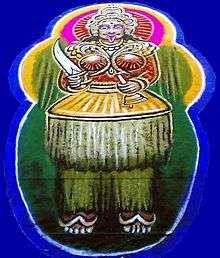Jumadi
Jumadi, also known by its Sanskritised name Dhumavathi, is an androgynous deity worshipped in the Buta Kola folk tradition. The Buta Kola cult is popular among the Tuluva ethnic people in the coastal districts of Karnataka, India.
| Jumadi | |
|---|---|
 |
Mythology
Jumadi is considered a deity of heavenly origin who descends to the Tulunadu region to receive worship from the people.
The various myths prevalent in the region describe the deity's insatiable thirst and the establishment of its cult among the dominant tulu communit of the region. The deity's cult is further exalted by the worship it receives from the Chowta royal family of Moodabidri. The Royal House of Chowta worships Jumadi at a shrine inside the Chowtara Aramane Palace.[1]
The deity's association with the ruling class among the Tulu people gives it the epithet "Rajan-Daiva" (Deity of the Rulers). The myths pertaining to Jumadi are oral in nature and are recorded in distinctive Tulu folk songs called paddanas.[2]
The paddanas record the various adventures and legends of the deity. They also record the various forms and names of the deity such as Kanteri Jumadi (Jumadi worshipped by the Bunt Feudal Lords, Kantanna Adhikari and Devu Poonja), Marlu Jumadi (the wild form of the princely Jumadi), and Sarala Jumadi (Jumadi worshipped by a thousand households).
 A silver mask depicting Jumadi
A silver mask depicting Jumadi A ritual dancer from the Pambada caste impersonating Jumadi
A ritual dancer from the Pambada caste impersonating Jumadi
See also
References
- Brückner, Heidrun (2009). On an Auspicious Day, at Dawn: Studies in Tulu Culture and Oral Literature. Otto Harrassowitz Verlag. p. 67. ISBN 978-3-447-05916-9. Retrieved 29 December 2011.
- Kamila, Raviprasad. "Kantheri Jumadi pad-dana in English". The Hindu. Retrieved 5 October 2017.